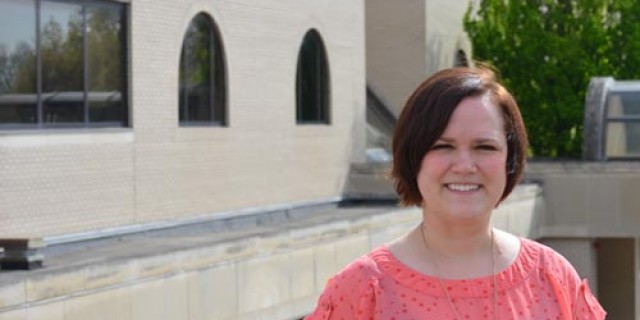Amy Esplund, M.A. in speech-language pathology, Class of 2015
For many students, determining a future career isn’t always easy and the path to deciding on a major can be difficult.
“It was a long, convoluted road,” Amy Esplund, a Eudora graduate student, said of her experience in choosing a major.
As an undergraduate, Esplund considered degrees in four areas: genetics, English, linguistics and speech-language-hearing. Eventually, she decided on a triple major in the latter areas as an undergraduate, then decided to pursue an advanced degree in speech-language-hearing. Esplund says she found her passion through “trial and error.” She took a variety of classes in a myriad of subjects until, after enrolling in a communication disorders class, she realized her true calling.
“I said to myself, ‘Yes, this is it. This is what I was looking for’,” Esplund said.
Now, Esplund is graduating with a M.A. in speech-language pathology. While she found her fit in speech-language-hearing, Esplund believes her broad liberal

arts and sciences education will play a significant role in her future success.
“I never thought that my English degree would come in handy. Then I did my field study at Lawrence High School and we had one classroom working on haikus, another group was working on parts of speech,” Esplund said.
The specific knowledge she gained from her English courses helped her better prepare and mentor high school students for success. Esplund said the writing skills she garnered through the English department were also crucial during her master’s program and will serve her well in her future career. She said the ability to write well and communicate effectively was expected from students in her program. Additionally, Esplund said her degree in linguistics was a unique supplement to her speech-language-hearing experience.
“Linguistics is an interesting perspective because the theory is so different. Linguistics and speech-language-hearing are such related fields but at the same time there’s a completely different theory backing both of them,” Esplund said. “So it gives me a broader perspective on what language is, how it works and how it develops.”
Her desire for a broad education and a variety of experiences continued throughout her career as a master’s student. Esplund had the opportunity to research the genetic, neurological syndrome Fragile X, complete assessments at the Schiefelbusch clinic, volunteer at the summer Communication Camp, complete field study at Lawrence High School, and collaborate with the KU Medical Center’s Center for Child Health and Development (CCHD) on ruling out autism diagnosis in pediatric patients.
Beyond her extensive academic experience, Esplund’s personal experiences have influenced her outlook, professional approach and future career. After

graduation, Esplund has accepted a position working with the deaf community in an outreach, advocacy and knowledge-sharing role. Esplund’s brother, who has an autism diagnosis, has helped her better understand his community and the struggles people with disabilities face in our society.
“He’s shaped my mentality a lot. It changes my mentality about advocacy and really trying to shape how our society treats people with disabilities,” Esplund said. “In the autism community there’s been a focus on viewing the diagnosis as, not necessarily a disability, just a different way of thinking and perceiving your world. And with deaf culture they have this really strong culture that goes around their language that’s just amazing. It’s about understanding that people want to define themselves.”
While her initial path was relatively uncharted, Esplund leaves the university with a specific career map and a greater sense of self. In allowing herself the opportunity to expand beyond initial ideas and broaden her horizons Esplund found her passion and she encourages other students to do the same.
“Explore every avenue that you’re interested in; you never know what’s going to spark your interest,” Esplund said. “It took me four different departments to find it. Don’t be afraid to come in without a clear idea.”
